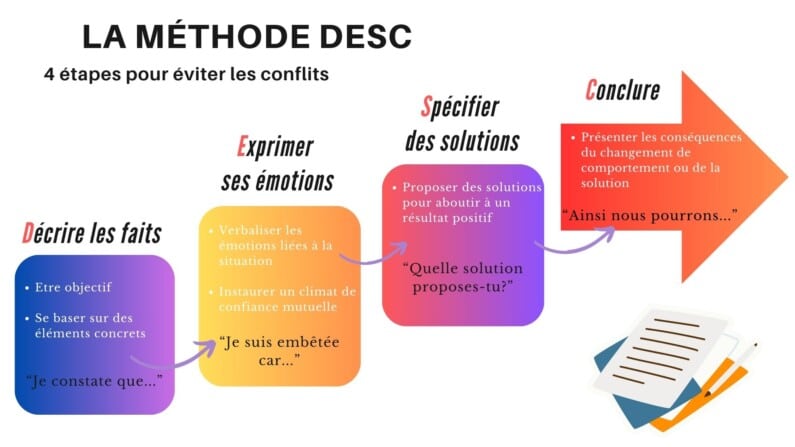Far from being a simple method of communication, l'assertiveness enables you to develop a positive attitude by learning to listen, express yourself and adapt to any situation. A real asset in a teamAn assertive assistant can express her ideas sincerely and easily mobilise teams around joint projects. This is a highly sought-after soft skill that can be acquired and developed through training. Élisabeth Duverney-Prêt, a specialist in the assistant and secretarial professions, outlines the ways in which you can do this.

On the job market, soft skills are all the rage! Unlike technical skills - hard skills - acquired through study and professional experience, soft skills are aptitudes and personality traits. These intrinsic qualities help people to integrate easily into a working environment and to interact effectively with those around them.
By their very nature, these so-called soft skills are cross-disciplinary: they cover everything from communication to teamwork, including organisational skills or agility at managing conflict.
Recruiters are well aware of their importance. 75 % of them would prefer to hire an employee with strong soft skills and weaker hard skills, rather than the other way round (Viavoice survey, January 2023). That just goes to show how important they are.
What is assertiveness?
In the top 5 of the most sought-after soft skills, assertiveness is gaining ground year on year. The Lefebvre Dalloz 2023 barometer even ranks listening, assertiveness and assertiveness as the most sought-after soft skills.adaptability and theempathy on the podium of decisive soft skills. Assertiveness flexibility and the ability to adapt This is a particularly sought-after talent, as it helps you to maintain good relations with others, contribute to a calm atmosphere in a team or company, and even make it easier to achieve your objectives.
For example, at a job interview, if you are able to express your needs clearly and set your limits calmly, you will immediately win the esteem of your interviewer.
Assertiveness, what are the benefits?
If you don't have this much sought-after soft skill, all is not lost - far from it! It is possible to acquire it by implementing simple and effective techniques through the bias various training courses. These will enable you to take advantage of the many benefits of assertiveness. Here are some of them.
To begin with, assertive behaviour within a company or a team enables you to get a message across smoothly, to listening For example, where you might have openly pointed out a glaring error and made the other person feel uncomfortable, you can express yourself calmly by introducing your demonstration as follows: "I'd rather say...".
Knowing how to use the right words, at the right time, and adopting the right good postureIt shows your professional entourage that your ideas are constructive and that you can be trusted to see them through. These essential qualities will enable you to assert yourself as someone who is trustworthy, listened to and respected.
Saying "no" to a request and at the same time showing that you manage your schedule perfectly becomes possible by using certain formulations.
Example of formulation
"I won't be able to this week, but I might be able to next Monday. Does that suit you?
A benevolent and tolerant attitude, accompanied by open gestures, a smiling face and frank eyes. It's a way of gently convincing the person you're talking to.
Active listening
You should also learn how to limit conflictual situations which, until now, have made you feel particularly uncomfortable. Knowing how to listen, being open-minded and encouraging constructive dialogue are essential keys to easing tensions. This is known asactive listening to hear each other's arguments. But what is it really about?
Active listening means first of all being silent, asking questions and then rephrasing. It's a real mark of respect towards those around you. If they know they've been heard and understood, they won't resort to conflict. This also works with your manager. These tools are very effective!
Example
If you are refused a raise, open up the dialogue by asking your manager about the reasons for the refusal, rather than about the refusal itself.
This helps us to understand them better and build a more balanced relationship.
The idea is to base communication on a genuine partnership that will ultimately help you achieve your objective.
[Training]
Perfect your communication skills: adapt your words to the profile of the person you're talking to, develop your assertiveness and empathy, mobilise your team, give energy to your ideas, reinforce your power of conviction, learn to express yourself with ease and get round blocking situations.
Completing a project
Finally, assertiveness makes it easier for you to lead a team towards the achievement of a project. The dynamic you put in place by being assertive will naturally lead to more exchanges, more learning, more teamwork. creativity and progress. The people around you will want to work together towards the common goal you have set, in a respectful and inclusive atmosphere.
For example, if you share your emotions and desires about a project, expressing yourself in the first person and asking others to do the same, your benevolent and tolerant attitude will encourage your colleagues to build a transparent and effective partnership with you.
How can this soft skill be strengthened?
The primary aim of assertiveness training is to help you diagnose your own behaviour. In this way, you will gradually eliminate any trace of a passive or aggressive attitude (by understanding the reasons why you behave in this way) and replace it with assertiveness. You'll be able to identify your blocks and overcome them, and you'll be clearer with yourself.
To develop your listening skills, ORSYS offers training in active listening. The aim? To increase your relational effectiveness in all circumstances, and more particularly in high-stakes professional communication situations.
[Training]
Develop your interpersonal effectiveness through active listening
What are the 3 fundamental stages?
Silence
Questioning
Reformulation
In order to cultivate self-esteem, an essential element for expressing oneself calmly, managing criticism, dealing with conflict and knowing how to say no, ORSYS has also developed training on assertiveness and self-assertionwhich can be supplemented by two days of improvement.
[Training]
Assertiveness and assertiveness
How can you develop your self-esteem and self-confidence to assert yourself?
Understanding your interpersonal style
Distinguishing between assertiveness, aggressiveness, manipulation and passivity
Saying no assertively
There is also training dedicated to conflict management using the DESC method (Describe, Express, Specify, Conclude). Among other things, you'll be able to resolve a conflict by working with the other party to find mutually satisfactory solutions.

The important thing is to take the time to think about the situation and come up with a good plan. For example: one of your colleagues needed to integrate figures to the report you are going to present tomorrow and did not do so.
- DFrançois, I explained to you last week that I would like the information on the new software, which only you can provide, to appear in my report.
- Expressing emotions: "I'm very annoyed that these elements are still not included in the shared document".
- SSuggest solutions: "Do you think you can manage it today? And for the next few times, can you let me know in advance if you think you won't be able to keep to the requested timing?"
- Conclude: "This will prevent me from finding myself in an uncomfortable situation with Mr X when I present my report.
In conclusion, assertiveness enables you to develop a positive attitude that will create a productive and serene climate around and within you. You'll be able to adapt to change thanks to this new way of listening, expressing yourself and adapting to the people you're dealing with.





